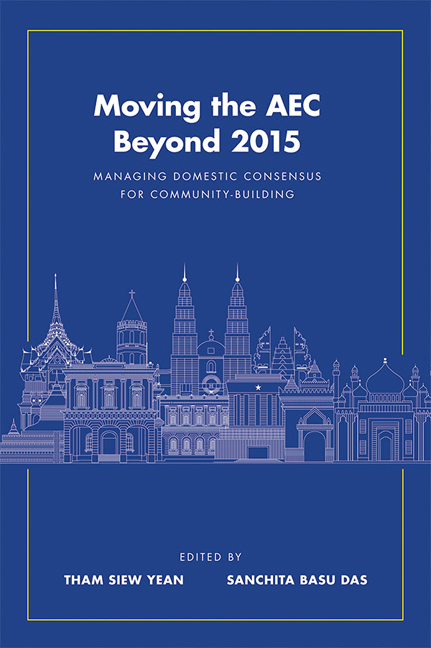Book contents
- Frontmatter
- Contents
- Foreword
- Preface
- Acknowledgements
- Abbreviations
- About the Contributors
- 1 Introduction: Economic Interests and the ASEAN Economic Community
- 2 ASEAN Economic Cooperation and Its Political Realities
- 3 Indonesia's Implementation of Facilitation and Harmonization Measures under the AEC
- 4 The AEC and Domestic Challenges in Malaysia: Examining the Liberalization of Services in AFAS
- 5 The Philippines and the AEC Beyond 2015: Managing Domestic Challenges
- 6 The AEC Beyond 2015: Implementation and Challenges for Singapore
- 7 Moving the AEC Beyond 2015: Managing Domestic Economic Interests in Thailand
- 8 Managing Domestic Consensus for ASEAN Community Building in Vietnam
- Index
Foreword
Published online by Cambridge University Press: 06 January 2018
- Frontmatter
- Contents
- Foreword
- Preface
- Acknowledgements
- Abbreviations
- About the Contributors
- 1 Introduction: Economic Interests and the ASEAN Economic Community
- 2 ASEAN Economic Cooperation and Its Political Realities
- 3 Indonesia's Implementation of Facilitation and Harmonization Measures under the AEC
- 4 The AEC and Domestic Challenges in Malaysia: Examining the Liberalization of Services in AFAS
- 5 The Philippines and the AEC Beyond 2015: Managing Domestic Challenges
- 6 The AEC Beyond 2015: Implementation and Challenges for Singapore
- 7 Moving the AEC Beyond 2015: Managing Domestic Economic Interests in Thailand
- 8 Managing Domestic Consensus for ASEAN Community Building in Vietnam
- Index
Summary
As we draw to the end of 2015 and the date of completion of the ASEAN Economic Community (AEC), there is a lot of analysis regarding what happens post 2015. Most analysis involve a review of the achievements and progress measured against the AEC Blueprint and then make recommendations on the way forward. Most of the recommendations are made up of completing the unfinished business of AEC 2015 and then go on to outline how to widen and deepen AEC 2015 so ASEAN can be an integrated production base and market. Only a few try to understand the root causes of the slower than desired progress towards this end goal. This book fills the gap by exploring how domestic conflicts at the level of each ASEAN country have impacted on each country's AEC commitments.
Therefore, the editors of this volume and ISEAS–Yusof Ishak Institute should be congratulated on choosing such a topic in a timely way. This publication is a very welcome publication because it attempts to get at the root causes of domestic constraints on the commitments that each ASEAN economy can make. Despite the acceptance of the vision at the very top level and the long-term process of development in ASEAN, it is a fact that the lack of appreciation for the ASEAN process in a country and that the benefits are not directly felt in the country, means that there has been lack of support domestically. Furthermore, despite the fact that the AEC has four pillars including an equitable ASEAN, there is not much in terms of commitments and concrete actions in this pillar. Most of the AEC commitments and actions have been in the first pillar of a single production base and market, which involves liberalization and facilitation.
In 2011 when Indonesia was the Chair of ASEAN, it was recognized that without strengthening of the equitable pillar it would be hard to have the confidence to progress on the first pillar and other pillars related to a competitive ASEAN and the way ASEAN engages externally. Without addressing the inequitable development due to economic integration within and between ASEAN countries, it was difficult to get more support to speed up opening up and integration.
- Type
- Chapter
- Information
- Moving the AEC Beyond 2015Managing Domestic Consensus for Community-Building, pp. vii - xPublisher: ISEAS–Yusof Ishak InstitutePrint publication year: 2016

